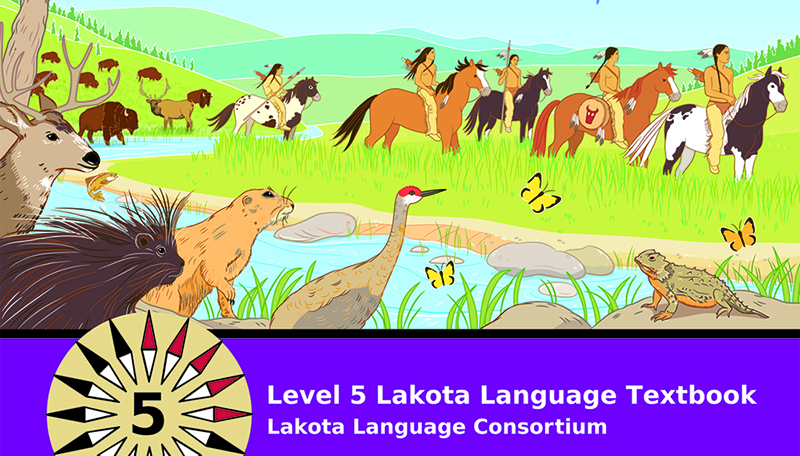
The 2014 Lakota Summer Institute is just 4 weeks away! Have you registered yet?
This three-week immersion in Lakota culture and thought is widely known as a rigorous “boot camp” experience in language study – but it has grown to embrace a wide range of learning experiences that go beyond the classroom, and connect you with other ways the language can come alive in your life.
Are you coming to LSI to learn Lakota?
LSI offers four tracks of Intensive study courses:
Intensive Lakota/Dakota for Beginners I – III
Intensive Lakota/Dakota for Pre-Intermediates I – III
Intensive Lakota/Dakota for Intermediates I – III
Intensive Lakota/Dakota for Advanced-Intermediates I – III
The aim of the Intensive coursework is to provide you with a large amount of exposure to the language and to work on all four language skills (reading, writing, listening comprehension, speaking). You will come away equipped with tons of new Lakota skills and knowledge.
Are you coming to LSI to improve your language teaching skills?
The new Level 5 Textbook will be introduced to teachers this year, along with introductions to Levels 1-4 in these courses:
Teaching Lakota/Dakota Level 1 Methods
Teaching Lakota/Dakota Level 2 Methods
Teaching Lakota/Dakota Level 3 Methods
Teaching Lakota/Dakota Level 4 Methods
Teaching Lakota/Dakota Level 5 Methods
If you want a refresher on teaching earlier Levels, these intensives are for you:
Teaching Lakota/Dakota Level 1&2 Methods, A-C
Teaching Lakota/Dakota Level 3&4 Methods, A-C
These refreshers emphasize teaching reading skills, grammar and vocabulary through props, flashcards and Total Physical Response methods; and teaching conversational skills through small-group activities. All work addresses specific units in each textbook. You will also tackle classroom management and how to change up your teaching for different learning styles.
Are you coming to LSI to deepen your understanding of the language from the inside out?
If you want to teach, speak, read or write Lakota with a deeper understanding of the language, here’s your “boot camp” coursework:
Lakota/Dakota Phonology I – III
Teaching Lakota/Dakota Grammar I – III
Are you coming to LSI as an advanced speaker of Lakota?
Languages change, shift meanings, create new words and forget old ones. How does this happen, and why?
Neologism Development I – III
Led by fluent first-language elder Ben Black Bear, Jr., these three classes allow YOU to help shape how Lakota will be changing in the future! Yes, you have a role to play in the growth of Lakota.
Remember the fun of watching Iktomi play his tricks on stage two years ago?
[youtube height=”HEIGHT” width=”WIDTH”]https://www.youtube.com/watch?v=oz8-RXxOwwA&list=UUF1xIAKeXcBDTLlSxUOAw6w[/youtube]
He’s back! And the new play needs actors!
Lakota/Dakota Drama/Performance I – III
Iktómi Lečhála Tȟawíčutȟuŋ (Iktomi’s New Wife) is a stage adaptation of two Lakota-Dakota tales about the trickster Iktomi: “Iktomi and the Ignorant Girl” and “Iktomi’s Blanket.” In the play, Iktomi has another fight with his old wife and he is determined to get a new one – and he will put on a dress to do it.
LSI is proud to announce Steve Elm as the director and teacher of this course. Elm (Oneida) comes to the production with a background in professional acting, directing and playwriting, as well as educational theater development and teacher training. Elm has performed and directed extensively for original Native American productions as part of festivals and for established Native American performance companies. He has taken up the challenge of working in a language he does not speak, and will guide the participants in improvisation that makes the spoken Lakota lines completely organic and expressive.
Are you coming to LSI looking for something completely different?
LSI helps you learn Lakota without taking a language course. These courses develop your language skills through cultural immersion.
Northern Plains Sign Language
Teaching Traditional Lakota Flute
Braintanning in Lakota
Dr. Lanny Real Bird returns with his presentation of nearly 200 hand signs that the Northern Plains Tribes used to communicate with one another; Kevin Locke and Richard Dubé are back with the completed lesson book for the traditional flute; and you can learn traditional hide-tanning in a course conducted entirely in Lakota.
As if all that wasn’t enough …
When you come to the 2014 LSI, you can also get an introduction to four other Plains languages: Crow, Mandan, Hidatsa, and Arikara. These tribes are starting their own educational push to language revitalization with teacher training events that are supported by Sitting Bull College this year, and will move out to the individual communities’ tribal colleges next year.
Are you here yet? We’ll be happy to see you!




